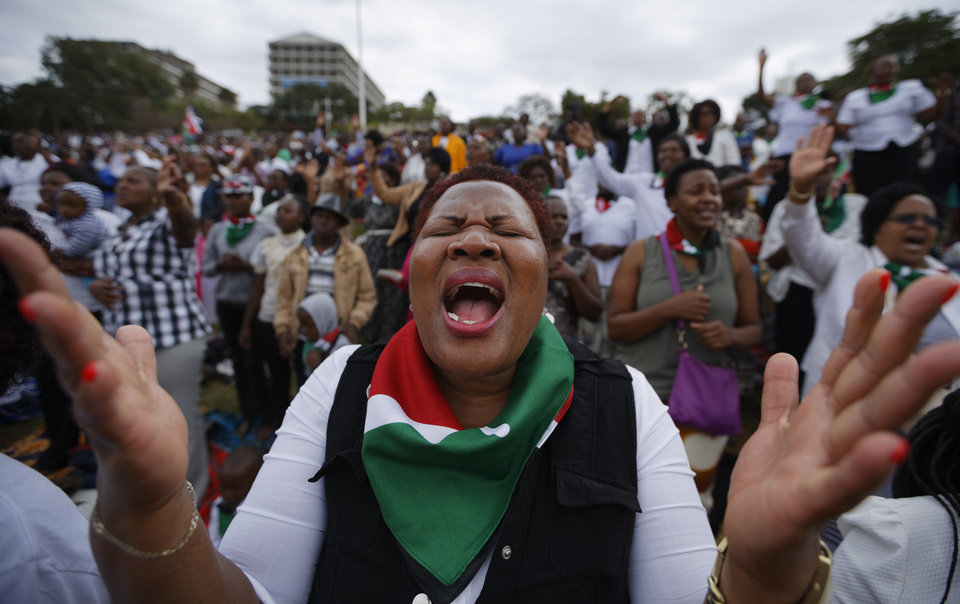
PRAYING FOR PEACE
Parties wrap up campaigns ahead of Kenyan presidential election

Kenyan President Uhuru Kenyatta will hold his final campaign rally today in Nairobi ahead of Tuesday’s decisive election. The opposition has questioned the election’s legitimacy due to accusations of the incumbent’s exploitation of military and security services in supporting his campaign.
The chaotic campaign trail, including the recent death of a Kenyatta supporter at a local governorship rally, echoes the communal violence that killed over a thousand after the 2007 presidential contest. At the time, Raila Odinga (who continues to lead the opposition) called for riots when Kenyatta’s Jubilee coalition announced an early victory.
Odinga has now accused Kenyatta’s campaign of staffing election offices with the Kenyan Defence Forces, thus risking military politicization and abuse of force in response to recent street protests. Due to colonial legacies of ethnic separation, Kenya’s elections are often catalysts for ethnic, tribal and clan violence. While Kenyatta and Odinga have attempted to focus the election on economic issues and anti-corruption, expect further ethnic unrest as the campaigns come to a close.
REGIONAL DEBATE
ASEAN Regional Forum to mull approach to North Korea

U.S. Secretary of State Rex Tillerson is using the ongoing ASEAN ministerial meeting to encourage “denuclearization of the Korean Peninsula”. The summit is one of the few events attended by both American and North Korean diplomats, although no direct talks are planned.
Assistant Secretary of State for East Asia Susan Thorton announced the US is using the meeting to pressure Southeast Asian states to “drastically” reduce diplomatic and trade ties with Pyongyang, especially by expelling the 50,000 regional North Korean guest workers that provide $2.3 billion in remittances to the cash strapped government. The US also aims to suspend North Korea from ASEAN forums altogether, arguing that its missile tests are a violation of ASEAN conflict-prevention rules.
The US may have limited success convincing countries to reduce ties with North Korea. The Philippines is openly considering downgrading diplomatic relations with Pyongyang, and regional states are growing increasingly uncomfortable with the political costs of using North Korean labour. But given ASEAN’s consensus-based decision-making and historical neutrality on the topic, it’s unlikely the US will sway the bulk of member states on the issue.
I-RAN TO HERAT
Afghanistan-Iran link paves way for new trans-Asia trade route

Today, Iran finishes construction of the first 30 kilometres of the Khaf-Herat railroad, officially connecting the country’s railway system to Afghanistan. The railway will initially be used for commercial cargo—particularly Iranian oil and cement shipments—but will eventually be open for passenger use.
The joint railway system comes as President Hassan Rouhani seeks to reintegrate Iran into the global economy following the 2015 Iran nuclear deal and subsequent removal of sanctions. The rail link is expected to boost a robust $2.8 billion trade relationship between the two countries by 5 million tonnes of cargo annually. The railway will also connect Iran to larger markets in India—the second largest importer of Iranian goods.
According to Islamic Republic of Iran Railroads Managing Director Saeed Mohammadzadeh, Iran and Afghanistan have also signed agreements with five other neighbouring countries to construct an East-West railway connecting China to Europe. Such a railway would allow Eastern countries to circumvent the Suez Canal and other crowded sea lanes, revolutionising trans-Asian trade and making Iran a key hub for the global transfer of goods.
Construction of Khaf-Herat shows that Iran not only intends to rejoin the international economy, but become a major centre of regional trade.

